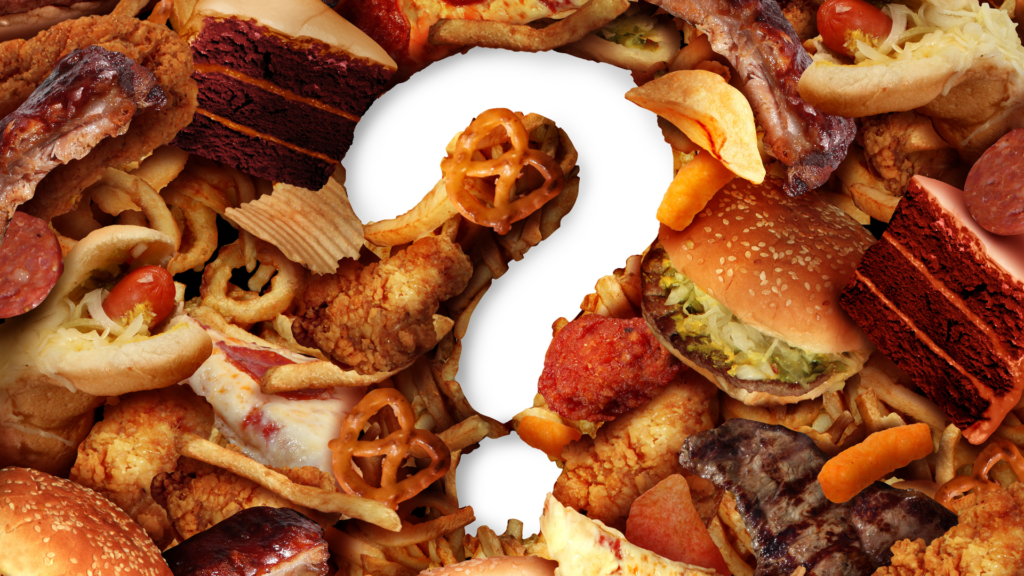- You are here:
- Home »
- Blog »
- Eat for Better Health »
- Top 6 Foods to Avoid

70-80% of your health comes from the food you eat so making small changes to your diet can help you break the “hereditary chain” and live a better quality of life. There are many reasons why you’ll want to avoid these top 6 foods.
Refined Sugar
- Increased risk of chronic diseases: Consuming refined sugar can increase your risk of developing chronic diseases such as obesity, type 2 diabetes, heart disease, and certain types of cancer.
- Poor dental health: Eating foods high in refined sugar can lead to tooth decay and cavities. Bacteria in your mouth feed on sugar, producing acid that erodes tooth enamel.
- Empty calories: Refined sugar is often referred to as “empty calories” because it provides no nutritional value. Consuming refined sugar can lead to weight gain and other health problems.
- Energy spikes and crashes: Eating foods high in refined sugar can cause your blood sugar levels to spike, leading to a temporary burst of energy, followed by a crash that can leave you feeling tired and sluggish.
- Addiction: Consuming large amounts of sugar can lead to addiction-like behaviors, causing you to crave sugar and making it difficult to cut back.
- 144 more reasons here.
White Flour
- Lack of nutrients: White flour is highly processed, which removes many of the essential nutrients found in the whole grain. This means that it contains fewer vitamins, minerals, and fiber than whole grain flour.
- High glycemic index: White flour has a high glycemic index, which means it can cause a rapid spike in blood sugar levels. This can lead to energy crashes, hunger pangs, and overeating.
- Weight gain: Because white flour is low in fiber and nutrients, it can contribute to weight gain and obesity. Eating foods made with white flour can also lead to overeating and a higher calorie intake.
- Digestive issues: Some people may experience digestive issues such as bloating, constipation, or diarrhea when consuming large amounts of white flour.
- Inflammation: White flour has been linked to increased inflammation in the body, which is a risk factor for many chronic diseases such as heart disease, cancer, and diabetes.
Dairy
- Lactose intolerance: Many people are lactose intolerant, which means they have difficulty digesting lactose, the sugar found in milk and other dairy products. This can cause symptoms such as bloating, gas, and diarrhea.
- Allergies: Many people may be allergic to dairy proteins, which can cause symptoms such as mucus in the throat, hives, swelling, and difficulty breathing.
- Ethical and environmental concerns: Some people choose to avoid dairy products due to ethical concerns about animal welfare, or environmental concerns related to the impact of dairy farming on the environment.
- Health concerns: Some studies suggest that consuming large amounts of dairy products may be linked to an increased risk of certain health problems, such as acne, prostate cancer, and ovarian cancer.
Pork
- Religious or cultural reasons: In some religions or cultures, pork is considered unclean or forbidden, so people who follow these beliefs avoid it.
- Parasites: Pork is one of the meats most commonly associated with parasitic infection.
- Antibiotic and hormone use: Many commercial pig farms use antibiotics and hormones to promote growth and prevent disease. When ingesting the meat, you are ingesting those too.
- Digestive issues: Some people may have trouble digesting pork due to its high fat content, which can cause symptoms such as bloating and diarrhea.
Fried Foods
- High in calories: Fried foods are often high in calories due to the added fat and oil used during the cooking process. This can contribute to weight gain and other health problems when consumed in excess.
- High in unhealthy fats: Fried foods are typically cooked in oil, which can be high in unhealthy saturated and trans fats. Consuming too much of these fats can increase your risk of heart disease, stroke, and other health problems.
- Low in nutrients: Fried foods are often low in nutrients such as vitamins, minerals, and fiber. Eating too many fried foods can displace healthier foods in your diet, leading to nutrient deficiencies.
- Linked to chronic diseases: Consuming large amounts of fried foods has been linked to an increased risk of chronic diseases such as heart disease, type 2 diabetes, and certain types of cancer.
- Can be difficult to digest: Fried foods are often high in fat, which can make them difficult to digest and cause digestive issues such as bloating, gas, and diarrhea.
Margarine
- Trans fats: Many types of margarine are made with partially hydrogenated oils, which contain trans fats. Consuming trans fats has been linked to an increased risk of heart disease and other health problems.
- High in unhealthy fats: Even margarines that do not contain trans fats can still be high in unhealthy saturated and omega-6 fats, which can also contribute to heart disease and other health problems when consumed in excess.
- Low in nutrients: Margarine is highly processed and contains few nutrients. Eating margarine instead of healthier fats such as olive oil or avocado can displace healthier foods in your diet, leading to nutrient deficiencies.
- Linked to inflammation: Some studies suggest that consuming large amounts of margarine may be linked to increased inflammation in the body, which is a risk factor for many chronic diseases such as heart disease and cancer.
- Not a whole food: Margarine is a highly processed food that is not a whole food. Eating whole foods, such as fruits, vegetables, and whole grains, is generally considered healthier than consuming highly processed foods like margarine.
Check out this video for more information.
Related Posts
Navigating Weight Plateaus
New Year, Healthier You: Simple Resolutions for 2024
Tasty Tips for Healthy Holidays
How to Eat Better and Tame the Candy Monster This Halloween
10 Natural Ways to Improve Digestion for Optimal Health
Natural Ways to Ease Heartburn
Healthy Sugar Swaps for Tasty Treats
The 6-2-1-1 Way of Eating
